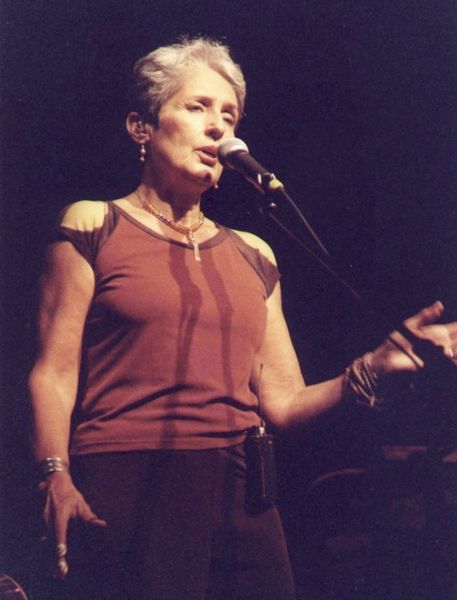
They called her the "barefoot Madonna."
Nearly 50 years ago, when an 18-year-old Joan Baez lit up the stage at the Newport Folk Festival, she was an ethereal, earthy chanteuse who launched a revival of the Americana musical genre that continues until today.
Now 67, her high soprano mellowed and golden with the years, Baez has released her 33rd solo album, Day After Tomorrow, a powerful collection of what can only be called American hymns, produced by that great Southern troubadour, Steve Earle.
Some of the 10 tracks are pure, worshipful odes to a loving God, the mother of God and mothers in general. Others are laments about a world at war. Baez's spirit of peace and justice, rooted in faith, remains the same as in 1959 Newport.
On Thursday in Nashville, Baez will receive the Spirit of Americana Free Speech award from the Americana Music Association in recognition of her half-century of contributions to American music and the First Amendment.
Previous recipients of the award include Chicago's Mavis Staples, Baez's dear friend Judy Collins and Earle. The first award was presented to Johnny Cash in 2002, the year before his death.
I can think of no other musician alive today more deserving of the Spirit of Freedom and few other women for whom I have a higher regard than Baez.
When I was a child, I recall seeing Baez perform on television and was taken with her soulful voice and beauty. She bore a striking resemblance to my mother's best friend, my Aunt Patti, herself an artist and justice seeker. Baez has long been close to my heart because of her familiar spirit, a soul sister to Patti who left this world far too young, when I was only 12.
Driving to a Pilates class Sunday morning, when I suppose I should have been headed to church, I tuned in to the local public radio station and heard her voice, singing first and then speaking to interviewer Bob Edwards.
She was talking about the new album, and when I entered the on-air conversation, she was discussing the first track, a glorious tune written by Earle called "God is God."
It says, in part:
I believe in prophecy
Some folks see things not everybody can see
And once in a while they pass a secret along to you and me
And I believe in miracles
Something sacred burning in every bush and tree
We can all long to sing the songs the angels sing
Yeah, I believe in God
And God ain't me . . .
God is God
The message of that song was as good as any I would have heard in church that morning. I stopped and bought the CD, and drove around listening to the whole thing, having a little worship service in my car.
Baez's early life was steeped in Christian tradition. Her grandfather, the Rev. Alberto Baez, was a Methodist minister. Her maternal grandfather was an Episcopal priest. Her father, Albert Baez, a prominent physicist who refused to work on the Manhattan Project that built the atomic bomb and turned down defense industry jobs for reasons of faith, eventually converted (along with the rest of the family) to Quakerism, the historical peace church.
For a time during her childhood in the early 1950s, the Baez family lived in Iraq, and the effect of witnessing the poverty and oppression of the Iraqi people made an indelible impression on young Joan.
As long as she's been singing, Baez has been singing for peace. She also has raised her voice year after year in protest of war, whether the conflict was in Vietnam, Cambodia or present-day Iraq and Afghanistan.
She marched with the Rev. Martin Luther King Jr. in Selma and sang "We Shall Overcome" for him during his March on Washington. In 1963, she founded the Institute for the Study of Nonviolence, and in 1998, along with Collins, rode a crane hundreds of feet into the air to sit in a giant redwood tree with the environmental activist Julia "Butterfly" Hill. For decades, she's lobbied for human rights and in opposition to the death penalty -- all the while singing some of the most beautiful, enduring songs of our time.
Her consistency and commitment are rare, especially in a music business where the bread and butter of the industry is appealing to the broadest audience (some would say the lowest common denominator) and offending as few consumers as possible.
The title track of Baez's masterful new album, a song written by Tom Waits, tells the story of a soldier from Illinois who is on his way home from the war.
You can't deny
The other side
Don't want to die
Any more than we do
What I'm trying to say,
Is don't they pray
To the same God that we do?
Tell me, how does God choose?
Whose prayers does he refuse? . . .
I'm not fighting
For justice
I am not fighting
For freedom
I am fighting
For my life
And another day
As the sister of an airman fighting in Afghanistan, her words touched my heart. For her tireless work to end conflicts that send young men and women into war zones, for her words -- spoken, sung or shouted -- urging us to see the ties that bind us rather than the barriers that divide us, I am ever grateful.
The Bible tells us that Jesus said the peacemakers are blessed.
Barefoot Madonna, full of grace, surely the Lord is with you.
You are blessed, and for that, so are we.
To hear Baez's interview with Bob Edwards about "Day After Tomorrow," click HERE.
Cathleen Falsani is religion columnist for the Chicago Sun-Times and
author of the new book,href="http://www.amazon.com/Sin-Boldly-Field-Guide-Grace/dp/031027947X/ref=pd_bbs_sr_2?ie=UTF8&s=books&qid=1218205881&sr=8-2">Sin
Boldly: A Field Guide for Grace.